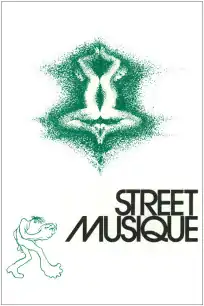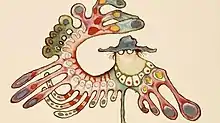Street Musique
Street Musique is a 1972 animated short film by Ryan Larkin produced by the National Film Board of Canada (NFB). It is a line animation of "music as performance",[1] in which actions of the film's characters are choreographed to the music of street musicians.[2]
| Street Musique | |
|---|---|
 DVD cover for the film | |
| Directed by | Ryan Larkin |
| Produced by | Ryan Larkin |
| Music by | Rick Scott Dick Tarnoff Rick Stone Rick Watson Jim Colby Jon Van Arsdell |
Production company | |
Release date |
|
Running time | 9 minutes |
| Country | Canada |
| Budget | $45,734[1] |
Soon after returning from the 42nd Academy Awards in 1970, for which his animated short film Walking had been nominated, Larkin was loaned by the NFB to a Vancouver art school, where he stayed for eight months conducting animation workshops.[3] He would travel to each student's studio to direct them, one of which was a group of street musicians.[3] These street musicians were the origin of the idea for the film, as Larkin had stated that "they would make a great focal point for my abstract images".[3]

The film consists of five or six vaguely defined segments whose animation matches the pace of the music to which it is set.[3] It begins with a photograph of a musician that is replaced by a line drawing of that photograph.[4] A transition leads to images of a man's body transforming into abstract improvisational forms using line shading and watercolours.[5][6] The figures undergo a continuous metamorphosis throughout the film.[3] Chris Robinson stated that the film's awkward ending is indicative of Larkin's creative hesitancy, as the last image is a figure waiting for music.[3] Larkin said that he "ran out of ideas" and "didn't know how to end the film".[3]
The film cost $45,734 (equivalent to $274,404 in 2021) to make.[1]
Street Musique won the Grand Prize at the Melbourne International Film Festival in 1973, which included a cash prize of A$2,500 from the Government of Victoria in Australia.[7] The film also received the Jury's First Prize at the Berlin Film Festival of Animated Films.[8][9] Larkin was fond of the Melbourne International Film Festival award because Street Musique "was a ten minute film up against all kinds of complicated feature films".[3] He used the prize money to support young artists in Montreal, to whom he rented his nine-room apartment for Can$100.[10]
In 2000, after having lived on the streets in Montreal and spending his nights at the Old Brewery Mission, Larkin met Chris Robinson.[11][12] During a discussion, Larkin told Robinson that after creating Street Musique, he was bereft of ideas for new projects.[13] Robinson invited Larkin to be a member of the selection committee for the Ottawa International Animation Festival.[14] The other three members were Chris Landreth, Pjotr Sapegin, and Andrei Svislotksi,[15] none of whom were aware of Larkin's identity.[16] After reviewing selections, they screened each other's films.[17] Larkin was last, showing Walking, Street Musique, and Syrinx.[17] Landreth was immediately inspired to create a documentary film about Larkin's life, which became Ryan.[18] The animated documentary incorporated in their entirety Street Musique and Walking.[19] Larkin's character in Ryan is animated to dance with characters from Street Musique.[20]
Awards
- International Week of Animation Cinema, Barcelona: Molinillo de Oro, First Prize, Special Techniques, 1972
- Melbourne International Film Festival, Melbourne: Grand Prix – Gold Boomerang, 1973
- International Short Film Festival Oberhausen, Oberhausen: First Prize of the International Animation Film Jury, 1973
- Columbus International Film & Animation Festival, Columbus, Ohio: Chris Bronze Plaque, 1973
- FIBA International Festival of Buenos Aires, Buenos Aires: Honorable Mention, 1974[21]
Notes
- Evans 1991, p. 197.
- Pillon 1983, p. 236.
- Robinson 2005, p. 101.
- Armitage 2011, p. 77.
- Armitage 2011, p. 78.
- Previews 1976.
- The Age 1973, p. 2.
- Cinémathèque québécoise 1971, p. 14.
- Cowie 1974, p. 387.
- Robinson 2005, p. 102.
- Dixon 2005.
- Robinson 2009, p. 105.
- Robinson 2009, p. 106.
- Robinson 2007, p. 259.
- Teninge 2000.
- Stone 2007.
- Robertson 2004.
- Singer 2004.
- Martinelli 2012, p. 62.
- Robinson 2007, p. 262.
- "Street Musique". onf-nfb.gc.ca. National Film Board of Canada. Retrieved 9 March 2023.
References
- Armitage, John, ed. (2011). Virilio Now: Current Perspectives in Virilio Studies. Polity. ISBN 9780745648781.
- Cowie, Peter (1974). International Film Guide 1974.
- Dixon, Guy (25 February 2005). "NFB hopefuls clutch hot tickets". The Globe and Mail. Retrieved 2 February 2014.
- Martinelli, Lawrence Thomas (July 2012). Il documentario animato. Un nuovo genere di racconto del reale e i suoi protagonisti internazionali [The animated documentary. A new kind of account of the real and its international protagonists] (in Italian). Latina: Tunué. ISBN 9788897165446.
- Pillon, Nancy Bach (1983). Reaching Young People Through Media. Libraries Unlimited. ISBN 0872873692.
- Robertson, Barbara (July 2004). "Psychorealism". Computer Graphics World. 27 (7).
- Robinson, Chris (2005). Unsung Heroes of Animation. John Libbey Publishers. ISBN 0861966651.
- Robinson, Chris (2007). The Animation Pimp. Cengage Learning. ISBN 9781435457935.
- Robinson, Chris (2009). Ballad of a Thin Man: In Search of Ryan Larkin. Cengage Learning. ISBN 9781598639087.
- Singer, Gregory (4 June 2004). "Landreth on 'Ryan'". Animation World Network. Retrieved 4 January 2014.
- Stone, M.J. (12 March 2007). "Ryan Larkin, filmmaker and derelict, 1943-2007". The Globe and Mail. Retrieved 4 January 2014.
- Teninge, Annick (18 July 2000). "Canadian Animators Lead The Pack At Ottawa 00". Animation World Network. Retrieved 4 January 2014.
- New Canadian Film. Vol. 3. Cinémathèque québécoise, Cinémathèque canadienne. Cinémathèque québécoise. 1971.
{{cite book}}: CS1 maint: others (link) - Previews. R. R. Bowker Company. 5. 1976.
{{cite journal}}: Missing or empty|title=(help) - "Canadian film tops festival". The Age. 11 June 1973. p. 2.
Works cited
- Evans, Gary (1991). In the National Interest: A Chronicle of the National Film Board of Canada from 1949 to 1989. University of Toronto Press. ISBN 0802027849.